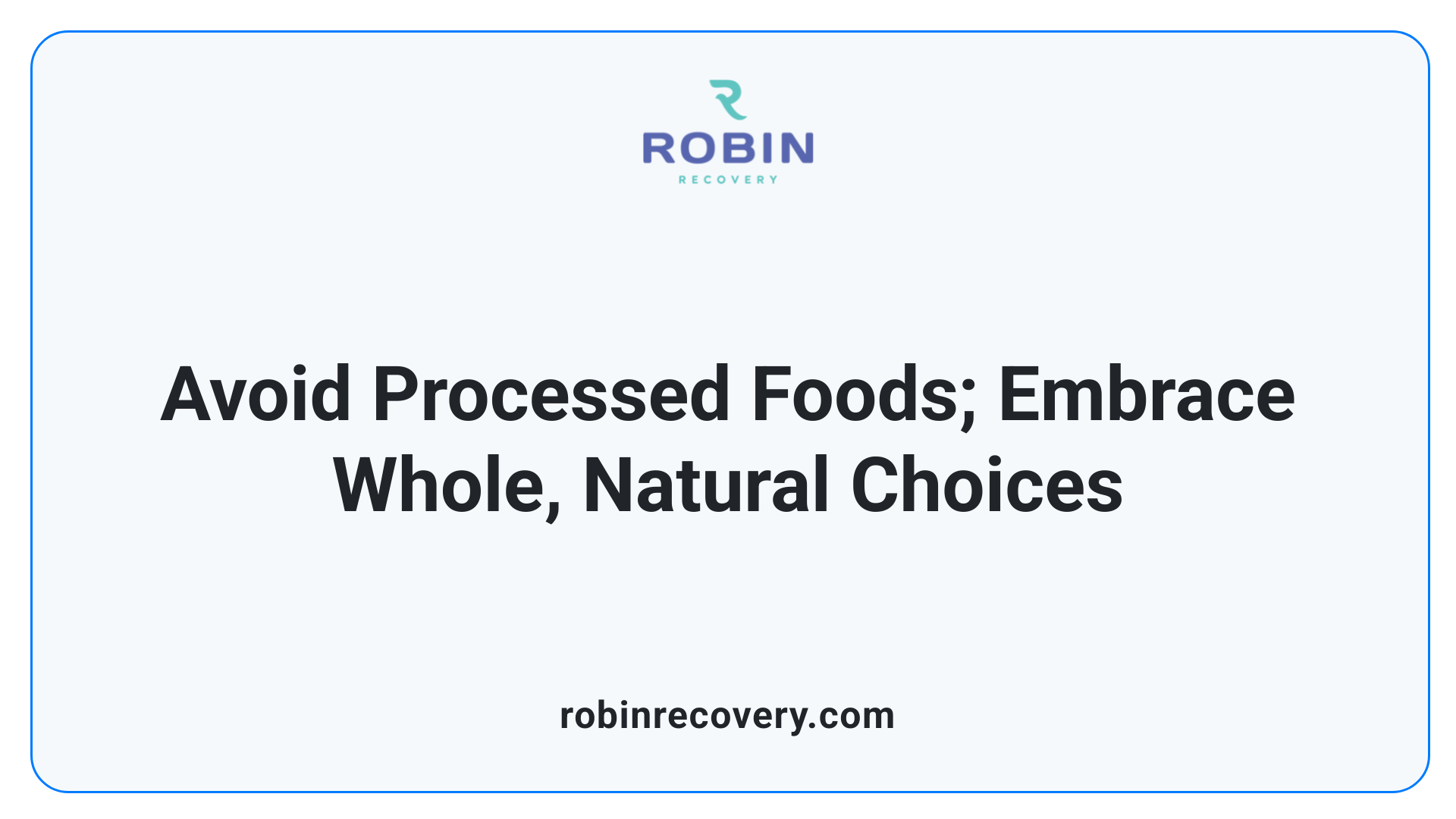What Foods Are Good for Recovering Alcoholic

Supporting Recovery with Proper Nutrition
Recovery from alcohol addiction is a multifaceted process that involves not only psychological and emotional support but also essential nutritional strategies. Proper diet plays a vital role in replenishing depleted nutrients, supporting organ healing, stabilizing mood, reducing cravings, and promoting overall health. This comprehensive guide highlights the key foods and nutrients that aid in alcohol recovery, ensuring a foundation for long-term sobriety and physical well-being.
Essential Nutrients for Recovery from Alcohol Addiction

What are some foods and nutrients that support recovery from alcohol addiction?
Supporting recovery from alcohol addiction requires a nutrient-rich diet that addresses common deficiencies, especially B vitamins like thiamine, B6, and folic acid, which are vital for brain health and preventing neurological issues.Foods such as fruits, vegetables, whole grains, lean proteins, nuts, and legumes supply essential vitamins, minerals, antioxidants, and amino acids that promote tissue repair, immune function, and mental well-being.Adequate hydration and balanced meals containing complex carbohydrates, healthy fats, and protein can help reduce cravings, improve mood, and support organ healing, particularly of the liver and brain.It is also beneficial to include foods high in omega-3 fatty acids, such as fatty fish and seeds, to help reduce inflammation and support neuroplasticity.Tailoring nutritional plans to individual deficiencies and avoiding processed foods high in sugars and unhealthy fats can further enhance recovery and reduce the risk of relapse.
How does proper nutrition support alcohol detox and early recovery?
Proper nutrition is vital for supporting alcohol detox and early recovery by replenishing nutrients depleted through alcohol use, such as B vitamins, minerals, and antioxidants, which are essential for repairing damaged tissues and supporting organ function.Consuming nutrient-rich foods like leafy greens, berries, citrus fruits, lean meats, nuts, seeds, and whole grains helps stabilize blood sugar levels, improve mood, and boost immune function, making the detox process more manageable.Adequate hydration with water and herbal teas aids in flushing out toxins and maintaining electrolyte balance, which is critical during withdrawal.Protein-rich foods support tissue repair and help control cravings, while supplements such as vitamins, minerals, and probiotics can address specific deficiencies and promote gut health.Avoiding processed foods, excess sugar, caffeine, and alcohol enhances the chances of a smoother detox and fosters a foundation for sustained recovery.
Which foods can help curb alcohol cravings?
Foods that can help curb alcohol cravings include those rich in vitamin B6, such as bananas, avocados, and chickpeas, which support neurotransmitter production and mood regulation.Incorporating omega-3 fatty acids found in salmon, walnuts, and flaxseeds can reduce inflammation and support brain health, making cravings easier to manage.High-protein foods like lean meats, eggs, and legumes help stabilize blood sugar levels and supply amino acids for neurotransmitter synthesis, aiding in craving reduction.Whole grains such as oats, quinoa, and brown rice provide steady energy release and prevent blood sugar spikes that often trigger cravings.Additionally, antioxidant-rich fruits and vegetables like berries, leafy greens, and spicy foods like chili peppers support overall health, mood, and endorphin release, further helping to diminish alcohol urges.
What are some healthy dietary practices to adopt during alcohol withdrawal and early recovery?
During alcohol withdrawal and early recovery, adopting healthy dietary practices is essential for supporting bodily repair and mental health.This includes focusing on a nutrient-dense diet rich in fruits, vegetables, whole grains, lean proteins, and healthy fats like omega-3s, which help replenish depleted nutrients and support brain function.Adequate hydration is crucial, as alcohol causes dehydration and nutritional deficiencies, and supplements of vitamins such as B1, B6, B9, and minerals like zinc and magnesium may be necessary under medical supervision.Avoiding processed foods, added sugars, caffeine, and unhealthy fats can reduce cravings, stabilize blood sugar, and promote overall well-being.Working with healthcare professionals, including dietitians, can help tailor nutritional strategies to address individual deficiencies and facilitate a healthier recovery process.
Are there specific foods or superfoods that support alcohol recovery efforts?
Certain foods and superfoods can support alcohol recovery efforts by nourishing the body, supporting detoxification, and healing damaged tissues.Nutrient-dense options such as leafy greens, berries, citrus fruits, whole grains, lean proteins, nuts, seeds, and fatty fish provide essential vitamins, antioxidants, healthy fats, and amino acids that promote liver health, brain function, and immune support.Foods rich in vitamins B, A, D, and E—like spinach, broccoli, fortified cereals, and lean meats—are particularly important for addressing deficiencies caused by alcohol misuse.Staying well-hydrated with water, herbal teas, and nutrient-rich soups also aids in flushing out toxins and maintaining electrolyte balance.Additionally, avoiding processed and greasy foods while managing cravings with wholesome options can further support the recovery process.
What role do supplements play in supporting recovery for alcoholics?
Supplements play a supportive role in alcohol recovery by addressing deficiencies caused by chronic alcohol use, which can hinder healing and increase cravings.Key nutrients such as B vitamins (particularly Thiamine, B6, B12, and Folate), Vitamin C, Magnesium, and Vitamin D help restore depleted stores, support brain and immune function, and reduce neurological and physical symptoms of withdrawal.Additional supplements like omega-3 fatty acids, milk thistle, NAC, GABA, 5-HTP, and amino acids may also aid liver health, reduce inflammation, and decrease alcohol cravings by regulating neurotransmitter levels and antioxidant defenses.It is essential to consult healthcare professionals before starting any supplement regimen to ensure safety and proper integration with medical treatment.Overall, proper nutritional support through targeted supplementation can significantly enhance physical and mental recovery during alcohol detox and rehabilitation.
How does nutrition impact brain health and recovery from alcohol misuse?
Nutrition significantly impacts brain health and recovery from alcohol misuse by providing essential nutrients that repair brain damage, support cognitive function, and enhance mental well-being.Adequate intake of B vitamins (such as B1, B6, B9), omega-3 fatty acids, antioxidants, and other key nutrients helps replenish deficiencies caused by alcohol abuse, which can lead to neurological issues like Wernicke-Korsakoff’s syndrome, confusion, and depression.Proper nutrition also promotes neuroplasticity, aiding the brain’s ability to rewire and recover lost connections, which is crucial during the recovery process.Additionally, maintaining gut health through probiotics and fiber-rich foods supports mood, reduces anxiety, and alleviates brain fog, all of which facilitate mental stability and physical healing.Overall, a balanced diet, hydration, and nutrient replenishment are vital components in supporting both the physical and psychological aspects of recovery from alcohol misuse.
What foods should be avoided during alcohol recovery, and what are recommended dietary choices to promote long-term sobriety?
During alcohol recovery, it is important to avoid processed foods high in sugar, excess sodium, fried foods, and caffeine, as these can promote inflammation, dehydration, and blood pressure fluctuations, which may hinder healing and increase craving risks.Instead, focus on a balanced diet rich in whole, unprocessed foods such as fruits, vegetables, lean proteins, whole grains, and healthy fats like omega-3s, which support tissue repair, liver detoxification, and brain health.Incorporating foods high in dietary fiber and complex carbohydrates can help alleviate gastrointestinal symptoms caused by alcohol use and prevent nutrient deficiencies, especially of B vitamins like thiamine, folate, and vitamin A.Adequate hydration through water and mineral-rich beverages is essential to combat dehydration and facilitate metabolic functions.Consulting with a healthcare professional or nutritionist to tailor a personalized plan can optimize recovery, ensuring nutritional sufficiency and reducing the risk of relapse.
This comprehensive approach to nutrition during alcohol recovery can greatly influence the effectiveness of detox efforts, physical healing, and the establishment of long-term sobriety.
Supporting Long-Term Sobriety Through Nutrition
Adopting a balanced, nutrient-rich diet is a cornerstone of effective alcohol recovery. By focusing on foods that replenish vital vitamins and minerals, support organ and brain health, and stabilize mood, recovering individuals can strengthen their physical and psychological resilience. Incorporating healthy habits such as hydration, avoiding processed and sugary foods, and seeking professional nutritional guidance ensures a sustainable path toward sobriety. Nutrition not only assists in navigating the detoxification process but also lays the foundation for lifelong health and relapse prevention. With the right dietary approach, individuals can optimize their chances for a successful, enduring recovery.
References
- Diet for Recovering Alcoholics: Nourish Your Recovery
- The Best Foods For Alcohol Detox And Addiction recovery
- Alcohol Use Disorder: Nutrition During Recovery - WebMD
- Alcohol Recovery Diet: What You Should Eat and Why It Matters
- Best Alcohol Detox Diet - The Recovery Village
- 7 Foods That Can Help Stop Alcohol Cravings
- 10 Best Foods To Eat During an Alcohol Detox - Conifer Park
- Best Foods to Eat During Alcohol Detox
